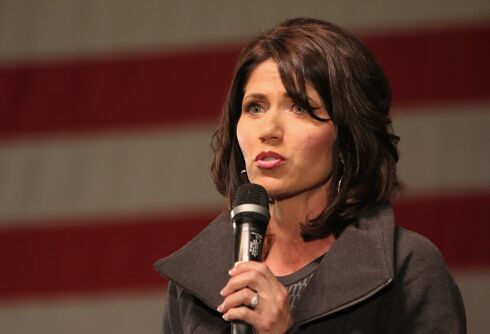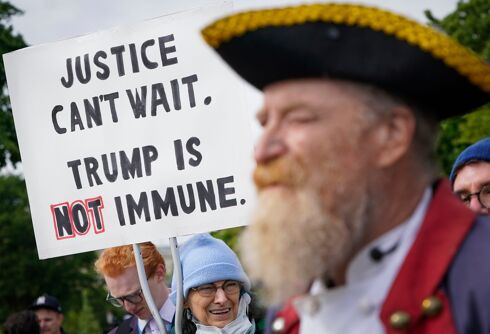Last week, Elon Musk banned the terms “cis” and “cisgender” from Twitter, calling the terms “slurs.”
It’s much ado about perhaps the dullest term someone could have come up with to describe people whose gender identity aligns with their sex assigned at birth. The Latin prefix trans- means “on or to the other side of” and cis- is its Latin opposite: “on this side.”
Related:
Elon Musk’s trans daughter petitions court to change name & sever ties with her transphobic father
The 18-year-old daughter wrote in court filings that she no longer wishes “to be related to my biological father in any way, shape or form.”
That’s it. Someone learned a little Latin and came up with a boringly neutral opposite.
Dive deeper every day
Join our newsletter for thought-provoking commentary that goes beyond the surface of LGBTQ+ issues
But Musk is far from the first cis person to claim oppression from the term “cisgender.” Rep. Lauren Boebert (R-CO) said the same thing in April, calling the term “ridiculous and a slur.”
And Musk has set off other people claiming that “cis” is a slur… while, of course, suggesting no alternative. Transphobic psychologist Jordan Peterson tweeted, “Call me cis to my face and see what happens” in the wake of Musk’s statement.
Anti-transgender journalist Abigail Shrier apparently thinks that taking the term out of its context proved that it’s “offensive.” Her argument is that using adjectives to describe people negates who they are; is a “tall woman” not a woman now because of the “qualifier”?
The arguments that it is not a slur are fairly strong. First, cisgender people are not an oppressed minority because they are neither oppressed nor a minority. They make up the overwhelming majority of the population and control nearly all the levers of power in the U.S. Every single person in Congress and every U.S. president in history has at least presented as cisgender, and cisgender people are less likely to be unemployed, the victims of violent crime, and unhoused compared to transgender people.
Moreover, a slur seeks to subordinate the target. Calling someone “cisgender” doesn’t do that. Plenty of cisgender people, when they find out what the word “cisgender” means, just think, “Oh, I guess that’s me, OK,” and move on with their lives. On the other hand, actual slurs make the targets feel attacked, ostracized, and ashamed. They carry histories of oppression and violence. They terrorize.
The arguments for why cis is a slur are easy to find on social media and don’t have quite as much thought behind them. One such argument is that some transgender people have sometimes said the word in a mean way. But that just raises the question: if someone gets mad at someone else and says, “You stupid man!” does that now mean that the word “man” is a slur? That’s an absurd conclusion drawn from an absurd premise. Value-neutral words can be used in different contexts with different tones, but that’s not what makes a slur.
Another argument is that some cisgender people don’t like the term – for reasons that can’t be specified – so using it while knowing that there exists somewhere a cisgender person who doesn’t like it makes it a slur in and of itself. But language doesn’t require absolute consensus around all words and definitions to function; someone might hate a specific word for purely sonic reasons and, unfortunately, the rest of us aren’t going to avoid it.
The most telling part of this argument – the part that gives away the whole game – is that they don’t present an alternative term. As a gay man, I believe that “fa***t” is a slur and I don’t want people calling me that, but I’ll quickly offer up “gay” as a neutral alternative. My problem is with the word itself and there are plenty of other perfectly acceptable words.
The “cis is a slur” crowd, though, doesn’t have an alternative word because the issue has never been the word itself, and they are arguing in bad faith. Their actual problem is with the idea that one’s gender identity isn’t a direct function of their genitalia or genetics, the idea that transgender people’s identities are legitimate at all. Since “I just plain refuse to recognize the humanity of people different from me” doesn’t play well with all audiences, they’re calling “cisgender” a slur and playing the victim.
Even better, by coopting the language of human rights advocacy, they take the attention away from transgender people – who could use some support right now! – and put it on themselves as cisgender people – who, as noted above, are doing just fine as a class.
And it is these people’s lack of good faith that allows them to argue that they have a right to pretend that transgender people don’t exist, to deadname and misgender transgender people as they please – “It’s my sincerely held belief that you don’t exist” – while crying foul for being forced to even acknowledge the part of their identity that gives them privilege over another group of people.
That’s how people like Jordan Peterson – whose YouTube channel was demonetized because he refused to stop misgendering and deadnaming Elliot Page – can complain about how he’s being called a word he doesn’t like. He’s not being inconsistent in his statements; he’s being consistently transphobic.
Musk is a deeply unserious person with several personal beefs against transgender people. But the anti-trans sentiment he’s stirring up on Twitter is very serious. And if people are going to combat it, they need words like “cisgender” to at least describe it.
















Cis is not a slur